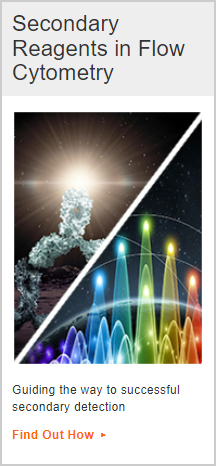Multiplex Unconjugated Primary Antibodies Using Secondary Antibodies

- On This Page
- Overview
- Different species
- Different classes
- Different isotypes
Overview
Multiplexing using differentially labeled primary antibodies is not always possible, but by a careful choice of unconjugated primary antibodies in combination with selected secondary antibodies, multiplexing can be successfully achieved.
Different Species
A combination of different host species is often the simplest way to multiplex. A primary antibody raised in mouse, together with a primary raised in rat, plus a primary raised in rabbit can be detected respectively with goat anti-mouse, goat anti-rat and goat anti-rabbit labeled as required.
Different Classes
IgG and IgM classes can be independently detected even if they are from the same species with the use of class specific secondary antibodies.
Different Isotypes
Another way to multiplex with primary antibodies from the same species is to use different isotypes of antibody such as IgG1, IgG2a, and IgG2b, in combination with isotype specific secondary antibodies.
Bio-Rad has generated recombinant isotype specific antibodies against the three main mouse isotypes: IgG1 (HCA309), IgG2a (HCA310), and IgG2b (HCA311). These antibodies are capable of detecting individual isotypes without any species or isotype cross-reactivity, thereby allowing the use of multiple unlabeled mouse monoclonal antibodies at any one time, for multiplexing without species issues. Click here to learn more.
Mix and match these different methods to increase options or simplify staining. There are however two key issues to consider:
- When mixing multiple secondary antibodies, they should be cross-adsorbed against unwanted targets to ensure specificity of your staining; for example, when using mouse and rat primary antibodies together, the anti-mouse secondary should not cross-react with the rat primary antibody and vice versa. This also applies to class-specific and isotype-specific secondary antibodies. Use our comprehensive guide to find out more.
- It is also important not to use a secondary antibody raised in the same host species as any of your primary antibodies, as this will result in false positives.
Read our overview on multiplex fluorescent western blotting to discover how it can benefit you.



